Tour Tech
Stage 21 - Sunday, July 27: Étampes - Paris/Champs Élysées, 143km
Gert Steegmans (Quick Step)
Photo ©: AFP
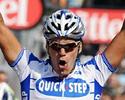
|
Finally, the last stage is here and the Tour has reached Paris. For many
in the peloton this is a victory in itself, but many others have designs
on a stage win on the most famous boulevard in the world. It's very likely
that a breakaway will try to get away and win the day – everybody wants
to be the first man on the Champs Élysées – but it's almost inevitable
that they will be reeled in by the sprinters teams and one of the fast
men will triumph.
The Champs Élysées is a much more complicated sprint than many other
places though. Aside from the cobbles, the course crosses the Place de
la Concorde with less than half a kilometre to go and the resulting chicane
serves to disrupt a sprinter's train. The winner is usually one of the
best sprinters, but rarely the one whose team has led him out.
Étampes is yet another first time stage town, but Paris of course has
hosted all 95 of them. Before the course reaches the capital though, there
are two fourth category climbs to negotiate – unusual for the final day
– which could decide a close polka dot jersey classification.
Stage details, Full
results, report & photos, Live
report, Video,
Podcast
Stage 20 - Saturday, July 26: Cérilly - Saint Amand Montrond (ITT),
53km
Stefan Schumacher (Gerolsteiner)
Photo ©: AFP
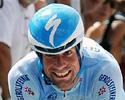
|
If the overall classification is anything like as close as it was last
year, we should once again be treated to a dramatic final time trial today.
Unlike the time trial in the first week, this one is over a much more
usual distance. The course gradient rolls without getting properly hilly
and so it should suit a more powerful rider over a climber.
The Tour visits another first time stage town in Cérilly, but this is
the second visit to Saint Amand Montrond. The previous time – 2001 – was
also the finish of the final time trial and saw Lance Armstrong (US Postal)
further increase his lead over Jan Ullrich (Telekom) with his fourth stage
win of that year's Tour.
Stage details, Full
results, report & photos, Live
report, Video,
Podcast
Stage 19 - Friday, July 25: Roanne - Montluçon, 165.5km
Sylvain Chavanel (Cofidis)
Photo ©: AFP
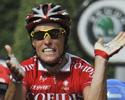
|
The Tour heads back into the centre of the country almost to where it
was two weeks ago as the peloton makes its weary way towards Paris. The
profile is almost as rolling as yesterday's, beginning with a third and
a fourth category climb inside the first 42 kilometres. The mid-section
is fairly flat, but then the final 50 kilometres become much lumpier,
although there are no classified climbs in this part.
Today is more suited to the sprinters than yesterday, but with a potentially
decisive time trial tomorrow the overall contenders may not want a hard
day and so a breakaway might succeed.
Roanne is yet another first time stage town, but Montluçon has been visited
five times before. Last time was in 2001 when Belgian Serge Baguet (Lotto)
beat Dane Jacob Piil (CSC) in a two-up sprint after the remains of the
breakaway was swallowed by the peloton. A similar scenario may well play
out this year.
Stage details, Full
results, report & photos, Live
report, Video,
Podcast
Stage 18 - Thursday, July 24: Bourg d'Oisans - Saint Étienne, 196.5km
Marcus Burghardt (Columbia)
Photo ©: AFP
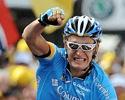
|
The Alps are behind us now, but this stage is by no means flat with a
third, a second and a fourth category climb to deal with. The course doesn't
suit the sprinters, but neither is it tough enough for the climbers and
overall contenders, for this reason it has breakaway written all over
it. Anyone who has managed to save a bit of energy over the preceding
few days will have a go here and in all likelihood the time gap allowed
will be enormous providing nobody of any note is in the break.
Bourg d'Oisans has been a stage start time 19 times before, but has never
hosted a finish. Sitting as it is at the foot of Alpe d'Huez, it is a
natural choice for the next day's stage. The last time a stage started
here was in 2006 when the course headed north to another mountaintop finish
at La Toussuire. Danish super-climber Michael Rasmussen (Rabobank) took
the victory alone on his way to taking the polka dot mountain jersey.
Saint Etienne is another regular Tour host, having been a stage town
23 times before, partly because it used to be the centre of the French
bicycle industry. Last time the Tour was here it saw Lance Armstrong (Discovery
Channel) cement his seventh and final Tour de France by taking victory
in the final time trial of the 2005 race. That day also saw the tragicomic
end to Michael Rasmussen's (Rabobank) hope of a podium place, as a disastrous
ride saw him crash twice and change his bike three times.
Stage details, Full
results, report & photos, Live
report, Video,
Podcast
Stage 17 - Wednesday, July 23: Embrun - L'Alpe d'Huez, 210.5km
Carlos Sastre (Team CSC - Saxo Bank)
Photo ©: AFP
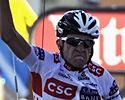
|
This is the stage that all climbers want to win. Those mythical 21 hairpin
bends have become synonymous with the Tour de France and a year without
the Alpe seems somehow to have something missing. This is a long stage
that takes in the familiar – but no less brutal – Cols du Galibier and
Croix de Fer, although as a change they are tackled in a different order
from usual.
In all likelihood, the main contenders will sit behind their team-mates
for as long as possible and look to make their move on the final steep
climb to Alpe d'Huez. The non super-climbers high up in the overall –
if there are any left at this stage – will be looking to hold on for as
long as possible. For the sprinters however, this will be a day of pure
suffering.
The small town of Embrun must think all of its Christmases have come
at once as this is their second stage of the Tour this year (they have
been awarded the start of stage 15 due to rock falls in the Alps forcing
a course change.) Alpe d'Huez on the other hand has hosted the Tour 25
times since that first time in 1952 when Fausto Coppi won, this equates
to almost every other year.
Last time the Tour finished here, in 2006, it saw the emergence of Fränk
Schleck (CSC) as a future major force in Grand Tours as he dropped riders
like former Giro d'Italia winner Damiano Cunego (Lampre) on the way to
victory.
Stage details, Full
results, report & photos, Live
report, Video,
Podcast
Stage 16 - Tuesday, July 22: Cuneo - Jausiers, 157km
Cyril Dessel (AG2R La Mondiale)
Photo ©: AFP
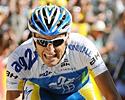
|
After an Italian rest day, the Tour heads back over the Alps to France.
After a fairly flat, but gradually rising 50 kilometres, the course tackles
the first of the day's two hors catégorie climbs: the Col de la Lombarde,
which marks the border crossing. After a long descent, the roads begin
to rise again to the second of the day's massive climbs: the Cime de la
Bonnette-Restefond, the highest point of this year's Tour, which at 2802
metres is also the highest paved road in the Alps.
There then follows a 23.5-kilometre descent to the finish in Jausiers,
the smallest town to host a stage finish at just over 1000 in population.
Once again, the high mountains should provide plenty of opportunity for
the favourites to attack one another, but that long descent will allow
any dropped riders a chance to make up some ground, keeping the gaps relatively
small.
Unsurprisingly, it is the first time that either town has hosted the
Tour – although Cuneo was the venue for yesterday's rest day. One of the
Cuneo's most famous sons is Michele Ferrero, whose eponymous company has
given the world Nutella, Ferrero Rocher and Tic Tacs.
Stage details, Full
results, report & photos, Live
report, Video,
Podcast
Stage 15 - Sunday, July 20: Embrun - Prato Nevoso, 183km
Simon Gerrans (Crédit Agricole)
Photo ©: AFP
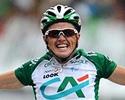
|
This stage was to have been a 216-kilometre epic from yesterdays' finish
town of Digne les Bains. Because of rock falls on the Col de Larche the
start has been moved to the ancient town of Embrun, shortening the stage
by 33 kilometres.
The stage starts climbing almost immediately up to the vertiginously
high Col Agnel at 2744 metres, which surprisingly is not the highest point
of his year's Tour. It does mark a first for 2008 though, as the Tour
has up until now been entirely contested in France and this is a border
crossing into Italy.
The stage descends into the Italian province of Cuneo, part of the Piemonte
region, crossing the rather sinister sounding third category Colle del
Morte to an uphill finish at the ski resort of Prato Nevoso. The 11.4-kilometre
ascent to the finish should provide a platform for the overall contenders
to take time out of one another before the second rest day.
This is the first visit of the Tour to both towns, but Pratonevoso has
been a stage finish in the Giro d'Italia. The most recent occasion was
in 2000, when Stefano Garzelli (then Mercatone Uno, now Acqua e Sapone)
put pressure on race leader Francesco Casagrande (Vini Caldirola) with
stage victory. Garzelli went on to take the pink jersey two days later
in the mountain time trial to Sestrieres.
Stage details, Full
results, report & photos, Live
report, Video,
Podcast
Stage 14 - Saturday, July 19: Nîmes - Digne les Bains, 194.5km
Oscar Freire (Rabobank)
Photo ©: AFP
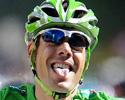
|
Despite not being a mountainous stage – and only featuring two fourth
category climbs – at the end of this stage, the Tour will arrive in the
Alps. Although those two climbs are the only ones to count, the altitude
rises steadily from 46 metres at the start in Nîmes to 599 metres at the
finish in Digne les Bains. The route crosses Provence and the Luberon
wine area between Mont Ventoux and the Côte d'Azur before finishing in
the spa town in the shadow of the high mountains that divide France form
its neighbour Italy.
Digne les Bains is a fairly regular host to the Tour, having been a stage
town eleven times before. Last time – in 2005 – David Moncoutié took the
second of his two career stage wins after attacking the break on the road
from Briançon to the north.
Stage details, Full
results, report & photos, Live
report, Video,
Podcast
Stage 13 - Friday, July 18: Narbonne - Nîmes, 182km
Mark Cavendish (Team Columbia)
Photo ©: AFP
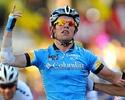
|
With just three fourth category climbs in the way, this should once again
be a stage for the sprinters. The route continues its way across the southern
edge of France between the Pyrenees and the Alps. It's likely that a break
will try to get away, but even more likely that the sprinters' domestiques
will bring them back before they reach the finish.
The stage travels from one Roman settlement to another: leaving the oldest
one in Narbonne, and arriving in probably the most famous one in Nîmes.
The capital of the Gard department, Nîmes is home to probably the highest
concentration of historic Roman sites outside Italy. These include the
best preserved arena in France – which still gets used for concerts and
bullfights, the Maison Carrée – a temple dedicated to the sons of Agrippa,
and most famously: the Pont du Gard – a three level aqueduct which lies
20 kilometres to the north.
Nîmes' other big claim to fame is as the origin of Serge de Nîmes, an
indigo blue fabric that has changed the world. Over the years its name
has been shortened to one word that most people will recognise: Denim.
The city has hosted the Tour 15 times before, with Aitor Gonzales (Fassa
Bortolo) taking the victory in 2004, the last time it finished here.
Stage details, Full
results, report & photos, Live
report, Video, Podcast
Stage 12 - Thursday, July 17: Lavelanet - Narbonne, 168.5km
Mark Cavendish (Columbia)
Photo ©: AFP
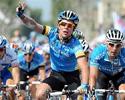
|
With the Pyrenean stages over, the Tour now begins its journey across
to the Alps. This stage features just one fourth category climb as it
descends steadily towards the Mediterranean and so is a prime opportunity
for the sprinters to reopen their accounts after a hard few days.
Lavelanet, situated in the heart of Cathar country with its hilltop castles,
has hosted the start of a Tour stage once before: in 2002. That day saw
a very similar course profile – although an entirely different route –
and finished not far from today's Narbonne finish in the Herault department's
capital Beziers. The stage was won by Scot David Millar (then Cofidis,
now Slipstream-Chipotle) from a breakaway group that finished almost ten
minutes ahead of the peloton.
Narbonne, with its 13th century Saint-Just cathedral, has been in existence
since 118BC when the Romans settle there. The city has hosted the Tour
seven times before, most recently in 2003 as it saw the start of the stage
to Toulouse that was won by Juan Antonio Flecha. The last stage to finish
here – or more accurately at Narbonne-Plage – was the second of five stages
won by Belgian sprint legend Freddy Maertens in 1981.
Stage details, Full
results, report & photos, Live
report, Video
, Podcast
Stage 11 - Wednesday, July 16: Lannemezan - Foix, 167.5km
Norwegian champion Kurt-Asle Arvesen (CSC-Saxo Bank)
Photo ©: AFP
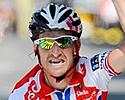
|
Despite still being in the region of the high mountains (Lannemezan is
in the Haute-Pyrénées department, and Foix is the capital of Ariège) this
stage features very little serious climbing: the only serious obstacle
of the day being the first category Col de Portal. Consequently, the course
has breakaway written all over it and will suit strong riders who have
lost enough time over the preceding two mountain stages for the contenders'
teams to let them go.
Both towns have hosted the Tour before in the past, but only as start
towns. Lannemezan has been there three times before between 1999 and 2004,
the last one of those being Lance Armstrong's second victory on the Plateau
de Beille where he narrowly beat Ivan Basso to the line.
Foix has previously hosted two stage starts: in 2001 and 2007. Last year's
stage to Loudenvielle-Le Louron saw a battle between overall contenders
Alberto Contador (Discovery Channel) and Michael Rasmussen (Rabobank)
on the Col du Peyresourde. In front of them though, Alexander Vinokourov
was rebuilding his Tour – after his first week crash – with a storming
solo victory. It later became clear exactly where Vino was getting his
energy though, and the stage victory has subsequently been awarded to
Kim Kirchen (then T-Mobile, now Columbia).
Stage details, Full
results, report & photos, Live
report, Video
, Podcast
Stage 10 - Monday, July 14: Pau - Hautacam, 156km
Leonardo Piepoli wins ahead of Saunier team-mate Juan Jose Cobo.
Photo ©: AFP
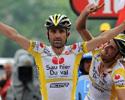
|
More high mountains in this stage which, despite being just 156 kilometres
in length, should prove to be one of the toughest of this year's Tour.
Despite a reasonably flat start, the stage finishes with the legendary
ascents of the Col du Tourmalet and Hautacam. This stage should see some
real gaps appear between the overall contenders as the favourites for
victory in Paris start to show themselves.
Outside Paris and Bordeaux, Pau is the most-visited town for the Tour
de France, featuring on the course no less than 61 times before. The first
time was in 1930 too, meaning that have only been ten Tours since then
that haven't called in at Pau. Last year – as this – the city was host
to a stage start and a rest day, but the last time a stage finished here,
in 2006, Spain's Juan Manuel Mercado (Agritubel) bested Cyril Dessel (Ag2r)
in a two-up sprint. The Frenchman was consoled though by taking the yellow
jersey for a few days.
Hautacam, a ski resort nestled above the pilgrimage centre of Lourdes,
has been a stage finish three times before. The most recent, and most
famous occasion was in 2000, when Javier Otxoa (Kelme) took the biggest
win of his career. All the headlines went to the rampaging Lance Armstrong
though as he stormed away from his rivals in the rain, taking the yellow
jersey that he would hold all the way to Paris for his second victory.
This stage route will be the one used on the Etape du Tour, which will
be run over a week earlier on Sunday, July 6th.
Stage details, Full
results, report & photos, Live
report , Video
, Podcast
Stage 9 - Sunday, July 13: Toulouse - Bagnères de Bigorre, 224km
Riccardo Riccò (Saunier Duval-Scott)
Photo ©: AFP
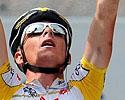
|
This is where the Tour really begins as the roads head upwards into the
high passes of the Pyrenees. Leaving the city of Toulouse, the course
heads south and east over a number of small hills, until it reaches Luchon
where the climbing really starts. The two first category Cols de Peyresourde
and Aspin are not the toughest climbs of the Tour, but both are tough
enough to punish anyone who isn't on top form. The descent to the finish
though, should mean that any gaps between the contenders will be small.
Bagnères-de-Bigorre features on the Tour route on a regular basis, sitting
as it does at the foot of the infamous Col du Tourmalet, which the race
tackles tomorrow, but has only been a start or finish town nine times
before. Recently, the town has tended to feature as a start town, rather
than a finish. The last time was that incredible day in 2003 when Lance
Armstrong took stage victory at Luz-Ardiden. He stormed away to win alone
after being brought down by a spectator's bag at the foot of the final
climb, the incident leading to the "did Ullrich wait" debate that kept
internet chat rooms buzzing for years afterwards.
Stage details, Full
results, report & photos, Live
report , Video
,
Podcast
Stage 8 - Saturday, July 12: Figeac - Toulouse, 172.5km
Mark Cavendish (Team Columbia)
Photo ©: AFP
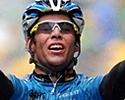
|
This is very much a transitional stage after two days in the hills of
the Massif Central; the Tour now heads south towards the high mountains
of the Pyrenees. The stage has two distinct halves: the first half features
four climbs – two third and two fourth category – while the second is
mostly flat as the roads descend into the lowlands of the Midi. There
are two unclassified bumps in the final 25 kilometres, but not enough
to stop the sprinters getting their trains organised in this, their last
chance before the roads get really steep.
Figeac has featured in the Tour twice before, most recently when locally
raised Cofidis star David Moncoutié won a solo breakaway victory. The
town's big claim to fame is as the birthplace of Jean-François Champollion,
the man credited with being the first man to translate Egyptian hieroglyphics.
As the fourth biggest city in France, Toulouse is a regular host to the
Tour, having been a stage town 25 times before. It was one of the original
start and finish towns of the original 1903 race where the great Frenchman
Hippolyte Aucouturier won his second stage in a row over an incredible
423 kilometres from Marseille. Arcouturier held the race lead (there was
no yellow jersey yet!) for those two stages, but lost it on the next leg
north to Bordeaux.
The most recent visit in 2004 saw Spanish classics specialist Juan Antonio
Flecha (then riding for iBanesto.com, but now at Rabobank) escape his
breakaway companions to win alone.
Stage details, Full
results, report & photos, Live
report , Video ,
Podcast
Stage 7 - Friday, July 11: Brioude - Aurillac, 159km
Luis León Sánchez (Caisse d'Epargne)
Photo ©: AFP
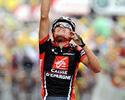
|
Stage seven sees the Tour spend a second day in France's Massif Central.
Despite being on of the shortest stages of the race, this will be no easy
day for the peloton. Like the previous stage, today's course will be nervous
as it traverses the twisting and rolling roads of this part of the country.
There will be very little flat riding all day, but the main obstacle will
be the second category Pas de Peyrol (Puy Mary) with 42 kilometres remaining.
The historic city of Brioude is another of this year's first time stage
towns, but Aurillac has been visited six times before. The last time the
Tour finished here was 1985, and the 237.5-kilometre stage from Saint-Étienne
was won by Spain's Eduardo Chozas. Race leader Bernard Hinault had crashed
in the sprint on the previous stage and was riding to his fifth overall
victory with a fractured nose.
Stage details, Full
results, report & photos, Live
report, Video,
Podcast
Stage 6 - Thursday, July 10: Aigurande - Super Besse, 195.5km
Riccardo Riccò (Saunier Duval - Scott)
Photo ©: AFP
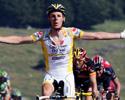 |
After five stages featuring no more than a smattering of fourth and third category climbs – and with none at all for the last three days – the course takes a decidedly hillier turn. After turning east yesterday, the race resumes its southerly course across France's hot Massif Central. The roads will be up and down all day, with two fourth category climbs in the first half. The final 50 kilometres is where the action starts with two second category climbs, including the 11-kilometre drag up to the finish at Super Besse.
This is the Tour's first visit to the small, fortified town of Aigurande, but it has been to the ski resort of Super Besse twice before. The last time it finished here, the stage was won by Dane Rolf Sørensen in a breakaway between the Alps and the Pyrenees. The ski resort sits 1289 metres high, above the town of Besse-et-Saint-Anastaise, which the stage passes through on the way to the finish.
Stage details, Full results, report & photos, Live report, Video, Podcast
Stage 5 - Wednesday, July 9: Cholet - Châteauroux, 232km
Mark Cavendish (Columbia)
Photo ©: AFP
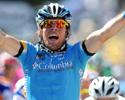 |
This is the longest stage of this year's Tour. However, with no classified climbs it will be far from the toughest as it heads eastwards towards the centre of France. Once again, the flat straight roads give every advantage to the sprinters' teams in the last chance before the terrain gets decidedly hillier tomorrow. Aspiring breakaway specialists may have other ideas though, and those who took it a bit easy in the time trial yesterday might fancy a tilt at this one.
This is the third Tour de France to feature the town of Cholet, and the second stage of this year's race as it hosted both the start and finish of yesterday's time trial.
Stage details, Full results, report & photos, Live report, Video, Podcast
Stage 4 - Tuesday, July 8: Cholet - Cholet (ITT), 29.5km
German Stefan Schumacher (Gerolsteiner) on his way to a stage victory
Photo ©: AFP
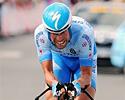 |
The first time trial of this year's Tour comes earlier than usual, perhaps because of the absence of a prologue. The stage is also just over half the distance as usual, being just 29-kilometre in length. The stage route, as well as being short, is very flat so – weather permitting – speeds should be high. The stage should appeal to the specialists, but gaps should be small so none of the favourites for the overall classification will be able to take too much time out of their rivals.
The Tour has visited Cholet just twice before, the last time when Dutchman Jeroen Bliijlevens (TVM) out-sprinted Italian Nicola Minali (Riso Scotti) and Ján Svorada (Mapei-Bricobi). By picking up time bonuses throughout the stage, Australian Stuart O'Grady (then GAN, now CSC) took the first maillot jaune of his career. The town sits on the banks of the Moine river and is most famous for the production of linen fabrics.
Stage details, Full results, report & photos, Live report, Video, Podcast
Stage 3 - Monday, July 7: Saint-Malo - Nantes, 208km
Samuel Dumoulin (Cofidis) took a brilliant win in Nantes
Photo ©: AFP
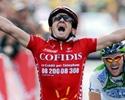 |
This should be a stage for the sprinters, especially as there are no classified climbs on today's route. After a rolling start over the small roads of Brittany, the course joins the fast, wider roads as it heads south to the finish in Nantes.
The port town of Saint-Malo is the most-visited place in the region of Brittany. From here it is possible to catch a ferry to and from various ports in the UK and the Channel Islands. This will be the Tour's eighth visit to Saint-Malo, the last time was 1980 when Dutchman Bert Oosterbosch took victory.
Stage details, Full results, report & photos, Live report, Video, Podcast
Stage 2
- Sunday, July 6: Auray - Saint Brieuc, 164.5km
Thor Hushovd (Crédit Agricole)
Photo ©: AFP
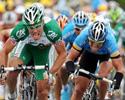 |
Once again, the rolling and hilly roads of Brittany will dominate this stage as it crosses the region from south to north from the Atlantic coast to that of the English Channel. Like yesterday's stage, the course features a number of small climbs including the third category Mûr-de-Bretagne. The sprinters' teams will be keen to deliver their fast-men to the finish line first; so a breakaway win here will be difficult.
Auray hosts the Tour for the first time, although it did host the start of last year's Hexagonal VTT (the MTB equivalent of the Tour). The town is situated on the coast of the southern Brittany department of Morbihan. It has a pretty harbour and is filled with atmospheric and narrow cobbled streets.
Stage details, Full results, report & photos, Live report, Video, Podcast
Stage 1
- Saturday, July 5: Brest - Plumelec, 197.5km
Alejandro Valverde (Caisse d'Epargne) fires a warning to his rivals
Photo ©: AFP
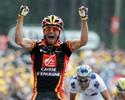 |
The Tour de France kicks off without a prologue (or time trial) for the first time since 1967; instead it starts with a rolling 195-kilometre road stage. After crossing four fourth category climbs the stage finishes at the top of the Côte de Cadoual – locally known as the Breton Alpe d'Huez. As there will be no time bonuses available on the stage, the first yellow jersey will securely be taken by the stage winner. The hilltop finish though, means that this is unlikely to be one for the pure sprinters.
Brest, a sub-prefecture of the department of Finistère and the most westerly city in mainland France, is a stage town for the 29th time and will host the Grand Départ for the third time – after 1952 and 1974. Its other big claim to cycling fame is of course the fact that it is the turning point of the epic 1200-kilometre Paris-Brest-Paris endurance event.
Stage details, Full results, report & photos, Live report, Video, Podcast
Preview: Evans, Valverde and Cunego clear favourites
Australia's Cadel Evans (Silence-Lotto) is the top favourite going into the 2008 Tour de France
Photo ©: Roberto Bettini
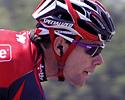 |
On the eve of another post-Lance Armstrong Tour de France, it is anyone's guess as to who will don the maillot jaune of best overall rider when the three-week race concludes in Paris. There are only a handful of contenders, but just how they will perform on the parcours with decreased time trial kilometres but more mythical mountain stages is unknown.
When organisers Amaury Sport Organisation (ASO) announced the route of the 95th Tour de France, it was clear that a rider who could excel in the mountains and hold his own in the time trials would have a shot at the overall win. The riders' climbing legs will be put to the test with four mountaintop stage finishes – Super Besse (stage six), Hautacam (stage 10), Prato Nevoso (15) and L'Alpe d'Huez (17) – while their time trialing abilities will be put to use in only 82.5 kilometres over two stages (4 and 20).
Full preview, Podcast |
Tour Features |
|
| Features:
|
Form guide:
Tour Videos
Stages
Stage 18: Bourg d'Oisans - Saint Étienne, 196.5km
Stage
17: Embrun - L'Alpe d'Huez, 210.5km
Stage
16: Cuneo - Jausiers, 157km
Stage
15: Embrun - Prato Nevoso, 183km
Stage
14: Nîmes - Digne les Bains, 194.5km
Stage
13: Narbonne - Nîmes, 182km
Stage
12: Lavelanet - Narbonne, 168.5km
Stage
11: Lannemezan - Foix, 167.5km
Stage
10: Pau - Hautacam, 156km
Stage
9: Toulouse - Bagnères de Bigorre, 224km
Stage
8: Figeac - Toulouse, 172.5km
Stage
7: Brioude - Aurillac, 159km
Stage
6: Aigurande - Super Besse, 195.5km
Stage
5: Cholet - Châteauroux, 232km
Stage
4: Cholet - Cholet (ITT), 29.5km
Stage
3: Saint-Malo - Nantes, 208km
Stage
2: Auray - Saint Brieuc, 164.5km
Stage
1: Brest - Plumelec, 197.5km
LeTour archives.
Lances 7 victories
The Tour Caravan
100 Years of le Tour
Highlights from Indurains 5 tour victories
Blood and tears, crashes of the Tour
A look at the village depart
The mountain stages
Letape de Tour
Le soap opera
The lighter side |
Tour News |
Tour Diaries |
- July 28 - Spanish hat-trick in France, Belgian fills the Quick Step void, Fofonov fired, detained by police, "Sensational" Tour for Gerolsteiner, Silence-Lotto toasts Evans, CSC tops in Tour prizes, Vansevenant makes history, Froome: "throw dopers in jail", Kelly impressed with CSC, Time running out to win in Cyclingnews-Felt Tour competition, Stage video and podcasts
- July 26
- Persistence pays off for Frenchman, Riis hoping yellow will help Sastre,
Sergeant quietly confident in Evans, Cancellara paying the price for teamwork,
Vande Velde ready for TT showdown, Millar relaxed, Flecha: 'I will never attack
again', Schleck senior upset by police behaviour
- July 25
- German returns victorious, No regrets for Fränk
Schleck, Schleck senior's car searched, Cunego's Tour in doubt after crash,
Quick Step's winless Tour continues, Arvesen Olympic-bound
- July
24 - Spaniard lives up to expectations, Evans down
but not out of Tour, Menchov still hopeful, Vande Velde rides strong after
tough day, Schumacher puts in another day at the front, Cyclingnews-Felt
TdF competition!, Tour video highlights and podcasts
- July
23 - Come-back for second French winner, Evans bullish
after Alpine stage, Vande Velde: 'Anything can happen', Augustyn unhurt in
spectacular plunge, Popovych fighting back from bad form, Hincapie: Down but
not out, Nibali fighting for white, Basque team on the hunt, Less than a week
left to enter the Cyclingnews-Felt Tour competition! Tour video and
podcasts
- July 22
- Schleck enjoying the moment, Evans fears Menchov, Vande Velde, Menchov counting
on experience, Vande Velde plugging towards podium, Nibali defends white jersey,
Don't miss your chance to win in Cyclingnews-Felt Tour competition!
- July 20
- Spaniard one step closer to green dream, Barloworld riders confident in
team's future, Cavendish may leave the Tour, Cunego ready for the Alps, Flecha
at Menchov's service, Kirchen to ride defensively at Prato Nevoso, Schumacher
relying on surprise, Kohl aiming for top-10, Andy Schleck dreams of Alpe d'Huez,
AG2R out for team classification
- July 18 #2 - Riccò and Piepoli sacked by Saunier Duval
- July 18
- Millar: 'Riccò was too good to be true', WADA
ahead of the curve with Micera, Saunier Duval-Scott stops racing, Riccò in
custody, Duenas carried 'a small pharmacy', Are anti-doping authorities 'winning
the game'?
- July 17 #2 - Riccò positive – Saunier Duval out of Tour
- July
17 - Domestique clinches first Tour win, Forbidden
substances found in Dueñas' room, UCI unhappy with ProTour rejection,
Sunderland explains CSC tactics, Liquigas caught by surprise with Beltran,
The day of a Silence-Lotto domestique, Four injured in team car/spectator
collision, Stage video and podcasts highlights
- July
16 - Evans expects tough battle ahead, Schleck must
attack for podium finish, Freire on point for maillot vert, Cavendish
unfazed by danger, Froome making progress at the Tour
- July 16 #2 - Tour de France hit by second doping positive
- July
15 - Comeback kid takes yellow, Saunier Duval charges
on Hautacam, Menchov: Schleck is in the game, Kohl regrets time loss on Super
Besse
- July
14 - Stage nine winner makes it look easy on Col
d'Aspin, Director sportifs analyze the day's strategy, Evans survives crash,
Difficult day tells Valverde he's feeling well, Sastre race ready for Hautacam,
Barredo pushing on despite cold, Stage video highlights and podcasts
- July
13 - Team Columbia contesting for multiple jerseys,
Evans looking forward, Spaniard holds on to KOM jersey, Rain no damper for
efforts of Cunego & Valverde, Break riders looking for credit with Tour
win, Liquigas' manager denies team connection to Beltrán, Former Beltrán
room-mate races on, Stapleton & Hincapie shocked but hopeful, Stage video
highlights and podcasts
- July 12
- Tour's first doping positive
- July 11
- Lead change shrouded in controversy, Vande Velde ready for overall, Riis
holds the line in CSC's three-pronged front, Ten abnormal blood results before
Tour start, Aldag close to realizing his dream, Kelly assesses stage six finish,
Stuart O'Grady diary, Sylvain Chavanel diary, Taking it easy at Le Tour:
Adam Hansen, Stage 6 Video highlights and podcasts
- July 10
- Showdown on Super Besse?, French riders prominent again, Columbia train
makes it 'impossible not to win', McEwen misses out, Vande Velde to help Millar,
Nibali gains experience, Haussler shaken up, Passeron collides with spectator
- July
9 - Yellow a confirmation for German, Evans delivers
time trial punch, Holczer on sponsorship future, Green-clad Kirchen going
strong, Millar to hunt for yellow on Super Besse, Saunier Duval-Scott's leaders
lose more time, Gómez headed home
- July 8
- French cycling revived with win, McEwen disappointed with day three, Valverde:
Sprinters missed their chance, Frischkorn: Tour not just another race, Menchov
loses time, as does Riccò, Hinault takes down French protester
- July 6
- Suspected break for Soler, Jégou hoped
for stage win and baby, Stapleton pleased with stage one, Schumacher can't
convert pole position into victory, Gerrans working for green, Lövkvist
hoping for good Tour, Tour diaries: Chavanel and O'Grady's stage one
- July 5
- CSC holds three cards for yellow, Quick Step has irons in the fire, Pereiro
content to work for Valverde, PMU in for four more years, Madiot for eight-man
Tour teams, Horner picks Tour favourites, Sánchez has respect for the
Tour
|
Stuart O'Grady
Stijn Devolder
Sylvain Chavanel
Adam Hansen
|
Tour Podcasts |
|
- Stage 21 - Results, news, analysis and interviews from the final stage in Paris.
- Stage
20 - Results, news, analysis and interviews from
Stage 20.
- Stage
19 - Results, news, analysis and interviews from
Stage 19.
- Stage
18 - Results, news, analysis and interviews from
Stage 18 to Saint Étienne.
- Stage
17 - Results, news, analysis and interviews from
Stage 17 to Alpe d'Huez.
- Stage
16 - Results, news, analysis and interviews from
Stage 16 to Jausiers.
- Rest
Day - A look back and look forward at the 95th Tour
de France on this second rest day.
- Stage
15 - Results, news, analysis and interviews from
Stage 15 to Prato Nevoso.
- Stage
14 - Results, news, analysis and interviews from
Stage 14 to Digne les Bains.
- Stage
13 - Results, news, analysis and interviews from
Stage 13 to Nimes
- Stage
12 - Results, news, analysis and interviews from
Stage 12 to Narbonne and all the details of the Riccardo Ricco doping scandal.
- Stage
11 - Results, news, analysis and interviews from
Stage 11 to Foix.
- Rest
Day - As Cadel Evans rests in yellow, we look back
at the 95th tour and preview the remaining 11 stages on the first rest day.
- Stage
10 - Results, news, analysis and interviews from
Stage 10 to Hautacam.
- Stage
9 - Results, news, analysis and interviews from Stage
9.
- Stage
8 - Results, news, analysis and interviews from Stage
8 to Toulouse.
- Stage
7 - Results, news, analysis and interviews from Stage
7 to Aurillac.
- Stage
6 - Results, news, analysis and interviews from the
exciting finish at Super Besse.
- Stage
5 - Results, news, analysis and interviews from Stage
5.
- Stage
4 - Results, news, analysis and interviews from Stage
4.
- More
High-tech Trends - at the 2008 Tour. Ellis Bacon
on a new bike being used by Team Columbia.
- Stage
3 - Results, news, analysis and interviews from Stage
3.
- Stage
2 - Results, news, analysis and interviews from Stage
2.
- High-tech
trends at the 2008 Tour. Cyclingnews Ben Atkins
on some new high-tech gadgets riders are using.
- Stage
1 - The team from ProCycling magazine give
you the all the news and views from a hectic stage one.
- Friday
Tour preview news - One day to go before stage one,
Ellis Bacon and Daniel Friebe of ProCycling magazine take you inside
the pre-race press conferences and preview stage one.
- Thursday
Tour preview news - Just two days before stage one,
host Brad Gibson updates you on the latest tour news along with Ellis Bacon,
Peter Cossins and Daniel Friebe of ProCycling magazine.
- Preview
|
|
| |
|
| |
|
| |
|
| |
|
|








































